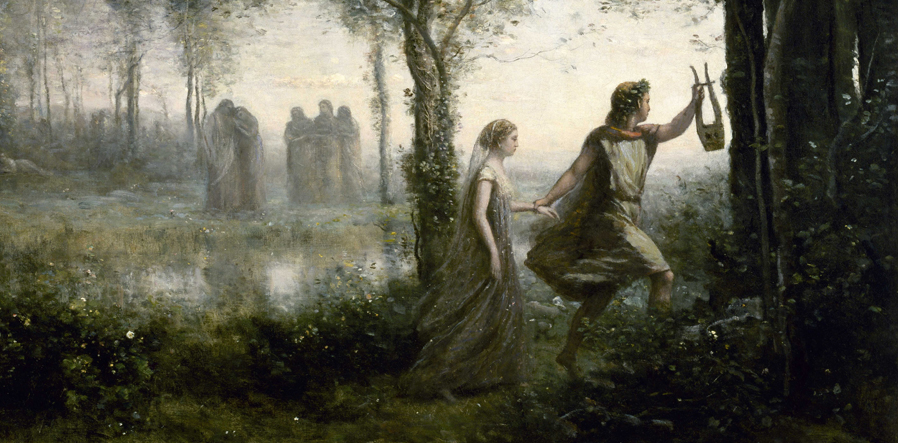Orpheus was a legendary Greek musician and poet whose songs could charm gods and wild beasts, trees and rocks. The most famous Orphean story tells of his journey to the underworld to rescue his wife, Eurydice. The woman, set upon by a satyr while walking, had fallen into a nest of vipers and had been bitten. Orpheus, overcome with grief, played such sad and mournful songs that even Hades and Persephone were moved and agreed to allow Eurydice to return with him to earth on one condition: he should walk in front of her and not look back until they both had reached the upper world. As soon as Orpheus had reached the upper world, he immediately turned to look at Eurydice her, forgetting that both of them needed to be in the upper world for the condition to be met. As Eurydice had not yet crossed into the upper world, she vanished for the second time, this time forever.
Operas based on the Orphean myths, and especially the story of Orpheus’ journey to the underworld were amongst the earliest examples of the art form and continue to be written into the 21st century.
Here is a non-exhaustive list of the best known operas on the myth of Orpheus.
The first genuine opera is Euridice by Jacopo Peri, with additional music by Giulio Caccini and a libretto by Ottavio Rinuccini. The opera was first performed in Florence on 6 October 1600 at the Palazzo Pitti with Peri himself singing the role of Orfeo.
A few years later is Claudio Monteverdi to tell the story of Orpheus’ descent to Hades in his opera L’Orfeo, with a libretto by Alessandro Striggio.
Orfeo is an opera in three acts, a prologue and an epilogue by the Italian composer Luigi Rossi. The libretto, by Francesco Buti, premiered at the Théâtre du Palais-Royal in Paris on 2 March 1647. It was one of the earliest operas to be staged in France.
On 5 October 1762 the piece Orfeo ed Euridice was first performed at the Burgtheater in Vienna, in the presence of Empress Maria Theresa. It was composed by Christoph Willibald Gluck and set to a libretto by Ranieri de’ Calzabigi.
L’anima del filosofo, Orfeo ed Euridice (The Soul of the Philosopher, or Orpheus and Euridice), is an opera in Italian in four acts by Joseph Haydn, the last he wrote. The libretto, by Carlo Francesco Badini, is based on the myth of Orpheus and Euridice as told in Ovid’s Metamorphoses. Composed in 1791, the opera remained unperformed until 9 June 1951, when it appeared at the Teatro della Pergola, in Florence.
Orphée aux enfers (Orpheus in the Underworld or Orpheus in Hell) is a comic opera with music by Jacques Offenbach and words by Hector Crémieux and Ludovic Halévy. It was first performed as a two-act “opéra bouffon” in Paris, on 21 October 1858, and was extensively revised and expanded in a four-act “opéra féerie” version, presented at the Théâtre de la Gaîté, on 7 February 1874.
Among the operas of the twentieth and twenty-first centuries on the myth of Orpheus we mention L’Orfeide (1925) by Gian Francesco Malipiero, Orphée (1993) by Philip Glass and Eurydice (2020) by Matthew Aucoin with a libretto by Sarah Ruhl.


